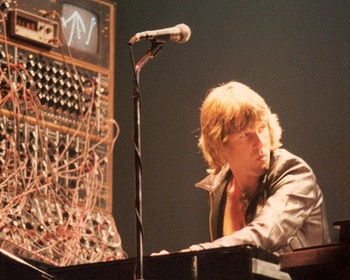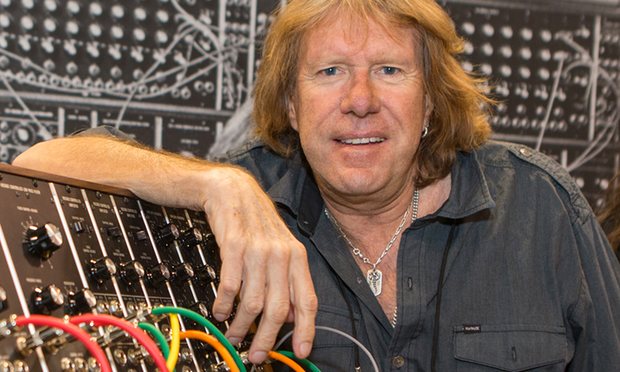
Although I was a listener to classical music at an early age, it was Keith Emerson’s adaptations with the progressive rock band Emerson, Lake and Palmer that opened that particular door a little further. I did not know the music of Modest Mussorgsky until I heard the ELP album “Pictures at an Exhibition.”
Famed music director Jim Scheuer commented on his Facebook page, “Keith Emerson and ELP introduced me to a lot of classical music. This [The Barbarian from their first album] was my first exposure to the music of Béla Bartók.”
Indeed, Emerson adapted Aaron Copland’s Hoedown, Hubert Parry’s Jerusalem and so much more, giving young rock listeners a fine taste of what they might have been missing in the classical world.
Emerson first came to attention with an early progressive rock band called The Nice. The music of that group charted the path that ELP would later follow. In 1970, Emerson, Lake and Palmer’s self-titled debut album appeared and, straightaway, Emerson began adapting classical pieces—in this case, the above-mentioned The Barbarian from Bartok. The succeeding albums carried on the custom.
Then came 1977 and the ELP album Works appeared. To this day, it remains my favorite of all the ELP albums—for several reasons.
It was a two-record set with each member getting his own “side” of a disc to express himself as he pleased. Guitarist and vocalist Greg Lake’s side contained nice pieces such as C’est la Vie and Nobody Loves You Like I Do.
Drummer Carl Palmer actually took a page from Emerson and included a track entitled The Enemy God Dances with the Black Spirits which was an adaptation from Sergei Prokofiev’s The Scythian Suite. That side also included an adaptation from J.S. Bach’s Two Part Invention in D Minor. And these were rock-and-rollers.
Keith Emerson’s side was wonderful to me. The complete side was filled with Emerson’s own composition entitled Piano Concerto No. 1 in, of course, three movements. This was something that I had wanted him to do for years. He had proven that he had the classical chops for performing but now he was showing what he could do with the pen, as well. I loved it.
But it was the fourth side, the side belonging to the whole group that grabbed me most. There were only two songs on that side. The first was Aaron Copland’s Fanfare for the Common Man. Magnificent.
This was the thing, though: Emerson had to get Aaron Copland’s permission to use the piece. The band’s manager called the publishing company and they refused to even forward the request to Copland. Stewart Young, ELP’s manager, was able to get Copland’s phone number and called him. According to Young, Copland said, “Send it over to me and let me listen.”
Copland loved it. In fact, the BBC interviewed Aaron Copland just before he passed away.
He said, “…it's very flattering to have one's music adopted by so popular a group, and so good a group as Emerson, Lake & Palmer. A lot depends on what they do with what they take, and naturally since I have a copyright on such material, they're not able to take it without my permission; so that in each case, where I have given my permission, there was something that attracted me about the version that they perform, which made me think I'd like to allow them to release it. Of course, I always prefer my own version best, but (laughs) what they do is really around the piece, you might say, rather than a literal transposition of the piece, and they're a gifted group. In that particular case, I allowed it to go by because when they first play it, they play it fairly straight and when they end the piece, they play it very straight. What they do in the middle, I'm not sure exactly how they connect that with my music but (laughs) they do it someway!”
To have such a composer as Aaron Copland enjoy what has been adapted must have been incredibly rewarding.
The final track was called Pirates. Sometime before, ELP had been commissioned to write the soundtrack to a movie about mercenaries. The movie would later be made (The Dogs of War) but without the ELP soundtrack.
With this momentous piece of music, ELP decided to rework it into something else. Pirates was the result. The nautical movement of the music and the vivid lyrics were captivating to me. I had always loved pirate stories (Treasure Island and Kidnapped) and movies (Captain Blood and Fire Over England) and this was my cup of tea.
The albums continued for some years and I loved them all. Emerson continued working in all the intervening years. A few years ago, however, he required surgery on his right hand and arm. He had increasing trouble with the nerves in his hand and arm. Emerson’s girlfriend, Mari Kawaguchi, was interviewed by London’s Daily Mail newspaper.
She told them, “He had concerts coming up in Japan and even though they hired a back-up keyboard player to support him, Keith was worried. He read all the criticism online and was a sensitive soul. Last year he played concerts and people posted mean comments such as, 'I wish he would stop playing.' He was tormented with worry that he wouldn't be good enough. He was planning to retire after Japan. He didn't want to let down his fans. He was a perfectionist and the thought he wouldn't play perfectly made him depressed, nervous and anxious.”
And the great Keith Emerson took how own life.
How sad that the composer admired by Copland, the keyboardist admired by other greats like Rick Wakeman, Patrick Moraz and others, and the man admired by all who knew him, should suffer at the words of those whose opinions mean nothing.
I would rather hear Keith Emerson in his twilight than most any other in their noonday.
It's the price we pay
For there's prizes to be taken
And glory to be found
Cut free the chains
Make fast your souls
We are Eldorado bound

 RSS Feed
RSS Feed
